When you're planning a sporty holiday in the outdoors, one question that often comes up is: To buy or not to buy the gear? On one hand, you don’t want to waste money on equipment you’d probably use once in a blue moon. And you don’t want to rent storage space just to keep the scuba diving gear, hiking poles and quickdraws you’ve gotten for that one spontaneous trip when you were inspired to explore both land and sea.
On the other hand, it is icky to have to come into contact with a stranger’s sweat or saliva – never mind that the rented equipment has been thoroughly cleaned and disinfected. It’s the thought that counts and your thoughts are taking you to places you don’t want to go.
Well, there are no hard and fast rules – and it really depends on personal preferences and budget, advised the various instructors and guides that CNA Lifestyle spoke to. Generally, if personal hygiene is involved, it is best to get your own set. The other considerations: How frequently and what level are you practising the sport at?
Read on for more advice from the pros.
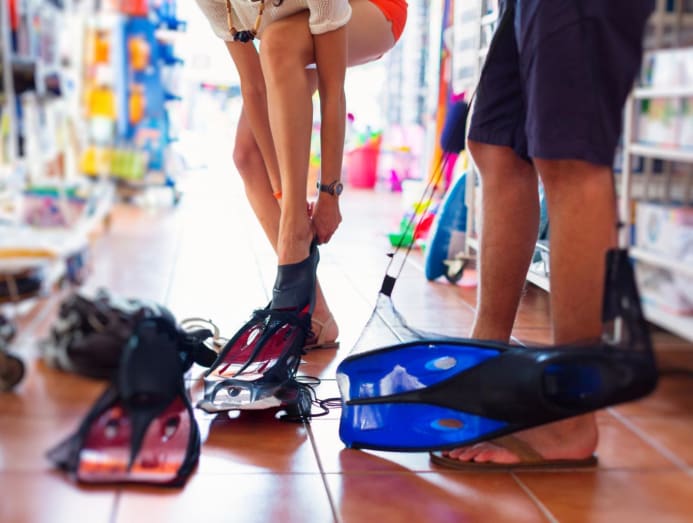
(Photo: iStock/nullplus)
SKIING
Basic equipment: Helmet, gloves, goggles, face mask, skis, ski poles and boots
What’s worth buying: Gloves, goggles and face mask
What’s better renting: Helmet, skis, ski poles and boots
If you ski a few times a year and are finally considering investing in some gear, start with the ski boots, said David Guigaz, the APAC mountain director from Club Med. “Boots are the foundation of a good ride. They are key for comfort and performance, and easier to bring on flights.” Bad-fitting boots can ruin your day as boots help to stabilise your feet, increase performance and help avoid injury, he said.
SNOWBOARDING
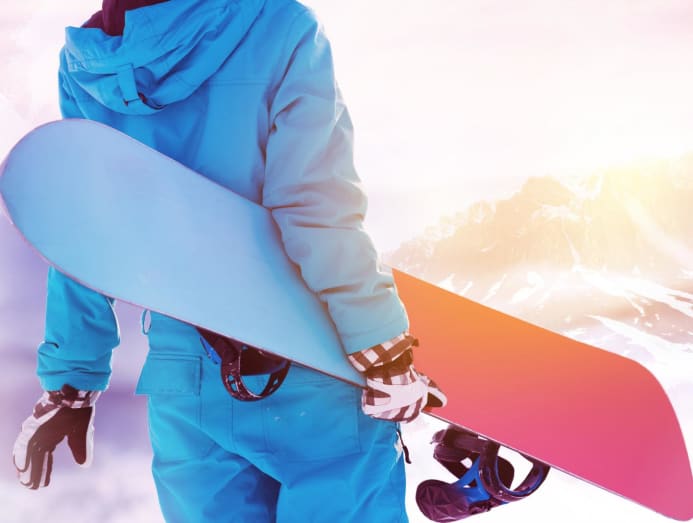
(Photo: iStock/molchanovdmitry)
Basic equipment: Helmet, gloves, goggles, face mask, snowboard, bindings and boots
What’s worth buying: Everything but the snowboard and bindings, if you plan to snowboard more than a week per season
What’s better renting: Everything, if you’re still figuring out whether the sport is for you
Gear that covers your face is better off bought than rented for obvious hygiene reason. “Also, it'd be a more comfortable fit for the user. When you're up on the mountain in sub-zero temperatures, every little bit counts,” said Glen Tang, a snowboarder who has been guiding for two seasons in Niseko and Rusutsu.
Put off buying a snowboard and bindings first because you’d want to try out the different styles of boards to see what suits you best before committing to a purchase, he said.
SCUBA DIVING
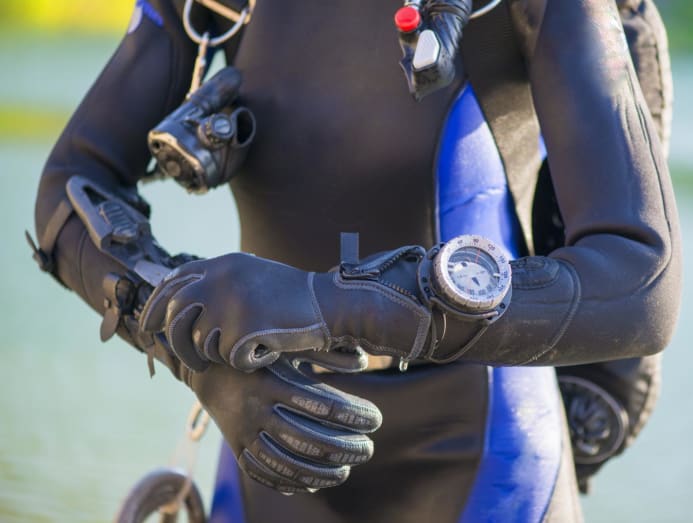
(Photo: iStock/Tutye)
Basic equipment: Mask, snorkel, booties, fins, buoyancy control device (BCD), regulator and wetsuit
What’s worth buying: Mask, snorkel, booties, fins and wetsuit
What’s better renting: BCD and regulator as a beginner and consider buying them later
Even if you dive just once or twice a year, it’s not a bad idea to buy your personal set of mask, snorkel, booties, fins and wetsuit because 1) hygiene and a better fit, and 2) they can last more than five years, said William, a dive instructor with Marlin Divers.
“Complete the advanced certification first before buying your full set of equipment, including BCD and regulator,” he advised. “It is more cost effective this way and you’ll know you can count on the equipment functioning properly for the next five years.”
ROCK CLIMBING
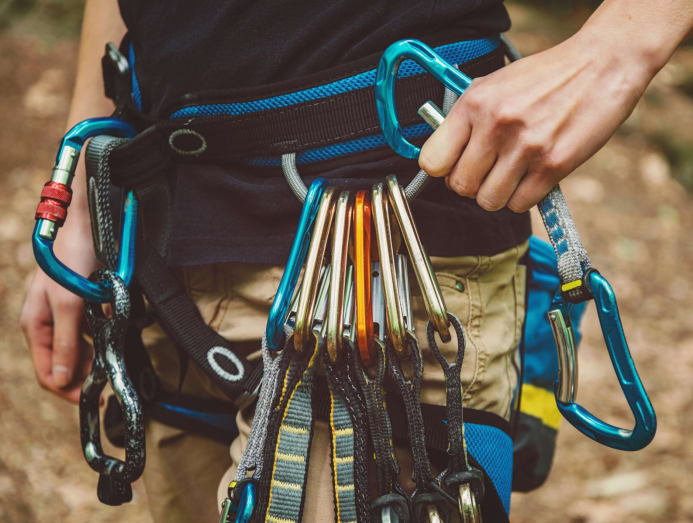
(Photo: iStock/Remains)
Basic equipment: Dynamic rope, belaying device, quickdraws, locking carabiners, slings, climbing shoes, harness, helmet and chalk bag
What’s worth buying: Everything
What’s better renting: Chalk bag (or you can always borrow a fellow climber's)
Safety is the No 1 priority, other than comfort and hygiene, said Kelly Khiew, an assistant rock guide and certified single-pitch instructor. With rented equipment, you don’t know whether the gear was previously mishandled, she said, and neither do you know its lifespan, which could potentially compromise its integrity. “A set of basic personal equipment is definitely worth investing in if you see yourself climbing in the long run,” she said.
BOULDERING
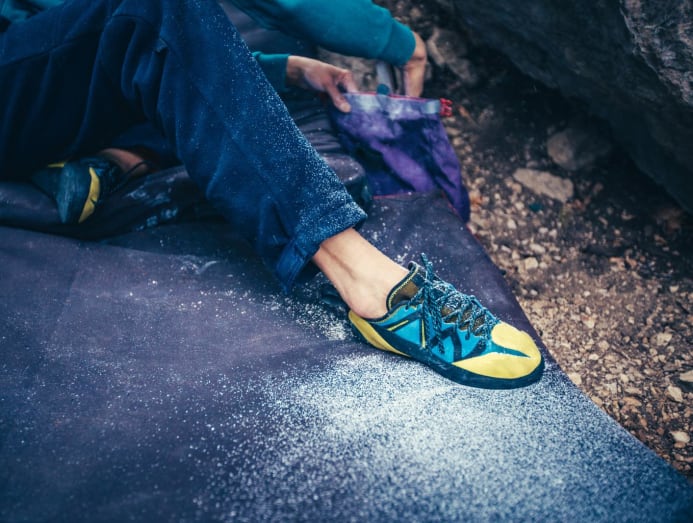
(Photo: iStock/Aleksandra Golubtsova)
Basic equipment: Climbing shoes, crash pad and chalk bag
What’s worth buying: Climbing shoes and chalk bag
What’s better renting: Crash pad
The crash pad is more forgiving because even an old and worn one still works, said Khiew. “If you are on a tight budget, get yourself a pair of climbing shoes for a start. Shoes that fit well will enable you to feel your footholds better, step on them more precisely and confidently, and that translates into better footwork and more efficient climbing,” she said.
HIKING
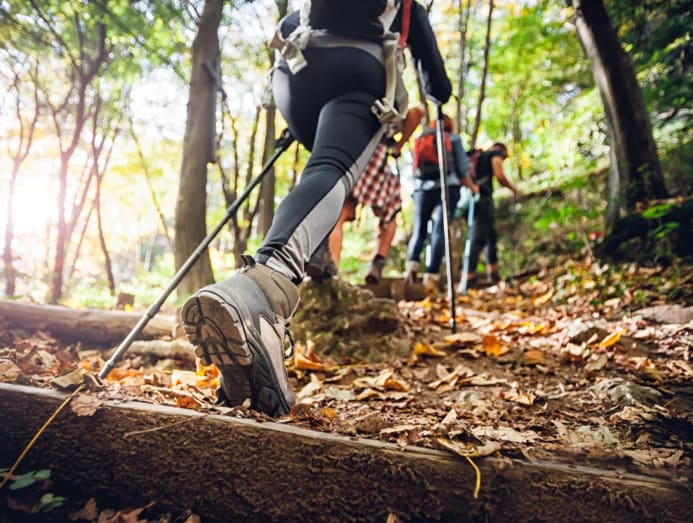
(Photo: iStock/leszekglasner)
Basic equipment: Backpack, hiking shoes, hiking poles, map and GPS, safety devices, first aid kit, multi-purpose tool and tent
What’s worth buying: Everything if you intend to hike regularly
What’s better renting: Hiking poles and tent if you’re still figuring out whether hiking is for you
The American Hiking Society recommends 10 essentials, which if you omit clothes, water, food and sun protection, includes hiking boots, map and GPS, safety devices such as a whistle and fire-starting kit, first aid kit, multi-purpose tool and tent.
According to Cynthia Lau, Decathlon’s commercial leader, specialised gear such as hiking poles and tent are more likely to become closet clutter due to unfamiliarity or eventual lack of interest, especially when hiking “can only be engaged in specific locations or certain times of the year”.
But “if you are planning to hike often and at high intensities, purchasing your own equipment may be more economical in the long run,” she said.
Continue reading...
On the other hand, it is icky to have to come into contact with a stranger’s sweat or saliva – never mind that the rented equipment has been thoroughly cleaned and disinfected. It’s the thought that counts and your thoughts are taking you to places you don’t want to go.
Well, there are no hard and fast rules – and it really depends on personal preferences and budget, advised the various instructors and guides that CNA Lifestyle spoke to. Generally, if personal hygiene is involved, it is best to get your own set. The other considerations: How frequently and what level are you practising the sport at?
Read on for more advice from the pros.

(Photo: iStock/nullplus)
SKIING
Basic equipment: Helmet, gloves, goggles, face mask, skis, ski poles and boots
What’s worth buying: Gloves, goggles and face mask
What’s better renting: Helmet, skis, ski poles and boots
If you ski a few times a year and are finally considering investing in some gear, start with the ski boots, said David Guigaz, the APAC mountain director from Club Med. “Boots are the foundation of a good ride. They are key for comfort and performance, and easier to bring on flights.” Bad-fitting boots can ruin your day as boots help to stabilise your feet, increase performance and help avoid injury, he said.
SNOWBOARDING

(Photo: iStock/molchanovdmitry)
Basic equipment: Helmet, gloves, goggles, face mask, snowboard, bindings and boots
What’s worth buying: Everything but the snowboard and bindings, if you plan to snowboard more than a week per season
What’s better renting: Everything, if you’re still figuring out whether the sport is for you
Gear that covers your face is better off bought than rented for obvious hygiene reason. “Also, it'd be a more comfortable fit for the user. When you're up on the mountain in sub-zero temperatures, every little bit counts,” said Glen Tang, a snowboarder who has been guiding for two seasons in Niseko and Rusutsu.
Put off buying a snowboard and bindings first because you’d want to try out the different styles of boards to see what suits you best before committing to a purchase, he said.
SCUBA DIVING

(Photo: iStock/Tutye)
Basic equipment: Mask, snorkel, booties, fins, buoyancy control device (BCD), regulator and wetsuit
What’s worth buying: Mask, snorkel, booties, fins and wetsuit
What’s better renting: BCD and regulator as a beginner and consider buying them later
Even if you dive just once or twice a year, it’s not a bad idea to buy your personal set of mask, snorkel, booties, fins and wetsuit because 1) hygiene and a better fit, and 2) they can last more than five years, said William, a dive instructor with Marlin Divers.
“Complete the advanced certification first before buying your full set of equipment, including BCD and regulator,” he advised. “It is more cost effective this way and you’ll know you can count on the equipment functioning properly for the next five years.”
ROCK CLIMBING

(Photo: iStock/Remains)
Basic equipment: Dynamic rope, belaying device, quickdraws, locking carabiners, slings, climbing shoes, harness, helmet and chalk bag
What’s worth buying: Everything
What’s better renting: Chalk bag (or you can always borrow a fellow climber's)
Safety is the No 1 priority, other than comfort and hygiene, said Kelly Khiew, an assistant rock guide and certified single-pitch instructor. With rented equipment, you don’t know whether the gear was previously mishandled, she said, and neither do you know its lifespan, which could potentially compromise its integrity. “A set of basic personal equipment is definitely worth investing in if you see yourself climbing in the long run,” she said.
BOULDERING

(Photo: iStock/Aleksandra Golubtsova)
Basic equipment: Climbing shoes, crash pad and chalk bag
What’s worth buying: Climbing shoes and chalk bag
What’s better renting: Crash pad
The crash pad is more forgiving because even an old and worn one still works, said Khiew. “If you are on a tight budget, get yourself a pair of climbing shoes for a start. Shoes that fit well will enable you to feel your footholds better, step on them more precisely and confidently, and that translates into better footwork and more efficient climbing,” she said.
HIKING

(Photo: iStock/leszekglasner)
Basic equipment: Backpack, hiking shoes, hiking poles, map and GPS, safety devices, first aid kit, multi-purpose tool and tent
What’s worth buying: Everything if you intend to hike regularly
What’s better renting: Hiking poles and tent if you’re still figuring out whether hiking is for you
The American Hiking Society recommends 10 essentials, which if you omit clothes, water, food and sun protection, includes hiking boots, map and GPS, safety devices such as a whistle and fire-starting kit, first aid kit, multi-purpose tool and tent.
According to Cynthia Lau, Decathlon’s commercial leader, specialised gear such as hiking poles and tent are more likely to become closet clutter due to unfamiliarity or eventual lack of interest, especially when hiking “can only be engaged in specific locations or certain times of the year”.
But “if you are planning to hike often and at high intensities, purchasing your own equipment may be more economical in the long run,” she said.
Continue reading...


